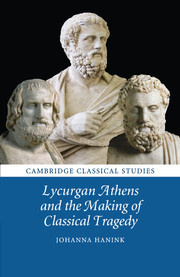
-
Select format
-
- Publisher:
- Cambridge University Press
- Publication date:
- July 2014
- June 2014
- ISBN:
- 9781107449589
- 9781107062023
- 9781107697508
- Dimensions:
- (216 x 138 mm)
- Weight & Pages:
- 0.48kg, 292 Pages
- Dimensions:
- (216 x 140 mm)
- Weight & Pages:
- 0.38kg, 296 Pages
You may already have access via personal or institutional login
Book description
Through a series of interdisciplinary studies this book argues that the Athenians themselves invented the notion of 'classical' tragedy just a few generations after the city's defeat in the Peloponnesian War. In the third quarter of the fourth century BC, and specifically during the 'Lycurgan Era' (338–322 BC), a number of measures were taken in Athens to affirm to the Greek world that the achievement of tragedy was owed to the unique character of the city. By means of rhetoric, architecture, inscriptions, statues, archives and even legislation, the 'classical' tragedians (Aeschylus, Sophocles and Euripides) and their plays came to be presented as both the products and vital embodiments of an idealised Athenian past. This study marks the first account of Athens' invention of its own theatrical heritage and sheds new light upon the interaction between the city's literary and political history.
Reviews
‘Hanink writes in a lucid and engaging style, bringing together the disparate evidential strands, archaeological, epigraphical and literary, into a persuasive synthesis, and handling deftly the balance and interplay between the political and literary aspects of her topic … the book makes a very valuable, well-rounded, contribution to our understanding of the literary, political and monumental aspects of post-fifth-century tragedy in general and its role in the Lycurgan policy agenda in particular; and the lively, well-crafted and accessible style in which it is written will make it attractive to teachers and students as well as useful to researchers.'
Stephen Lambert Source: Bryn Mawr Classical Review
Contents
Metrics
Altmetric attention score
Full text views
Full text views help Loading metrics...
Loading metrics...
* Views captured on Cambridge Core between #date#. This data will be updated every 24 hours.
Usage data cannot currently be displayed.
Accessibility standard: Unknown
Why this information is here
This section outlines the accessibility features of this content - including support for screen readers, full keyboard navigation and high-contrast display options. This may not be relevant for you.
Accessibility Information
Accessibility compliance for the PDF of this book is currently unknown and may be updated in the future.


